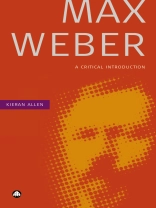Max Weber is one of the founding fathers of sociology. He is often referred to as a sophisticated ‘value-free’ sociologist. This new critical introduction argues that Weber’s sociology cannot be divorced from his political standpoint. Weber saw himself as a ‘class conscious bourgeois’ and his sociology reflects this outlook. Providing clear summaries of Weber’s ideas – concentrating on the themes most often encountered on sociology courses – Kieran Allen provides a lively introduction to this key thinker.
Kieran Allen explores Weber’s political background through his life and his writing. Weber was a neo-liberal who thought that the market guaranteed efficiency and rationality. He was an advocate of empire. He supported the carnage of WW1 and vehemently attacked German socialists such as Rosa Luxemburg. Weber’s most famous book, The Protestant Ethic and the Spirit of Capitalism, ignores the bloody legacy associated with the early accumulation of capital. Instead, he locates the origins of the system in a new rigorous morality. Using a political framework, Kieran Allen’s book is is ideal for students who want to develop a critical approach.
表中的内容
1. Introduction
2. The Sociologist Of Empire
3. The Spirit Of Capitalism
4. Why Didn’t Asia Develop?
5. Methodology
6. Class, Status And Party
7. Domination And Bureaucracy
8. The Fall And Rise Of The West
9. Capitalism, Socialism and Bureaucracy
10. War and Revolution
Conclusion
Additional Reading
Bibliography
Index
关于作者
Kieran Allen is a Senior Lecturer in Sociology at University College Dublin. His books include 1916: Ireland’s Revolutionary Tradition (Pluto, 2016), Durkheim (Pluto, 2017), Marx (Pluto, 2017) and Weber (Pluto, 2017).












